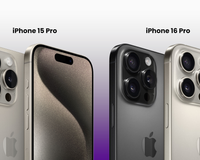The new Apple iPhone 14 models dropped at the #AppleEvent this September, so if you’re thinking about upgrading or worse you need an upgrade (phone fallen down the loo again?) - it’s only natural to question if you should buy the iPhone 13 or older models at a discount like this one from reboxed or go new.
The iPhone 13 Pro Max was arguably the best smartphone of 2021. While the iPhone 14 is coming to shelves this month, there’s no massively good reason for giving up on your handy iPhone 13.
Even with the iPhone 14 and iPhone 14 Pro release, is buying a new iPhone a good idea right now?
Here’s what our expert team would recommend.
When will the iPhone 14 go on sale?
At the #AppleEvent, Apple revealed its flagship the iPhone 14 that is set to go on sale for pre-order on 9th September and available to buy in store on 16th September. The 14 Plus is launching slightly later on 7th October.
What can you expect from the iPhone 14 lineup:
#iPhone 14 (6.1-inch) – the entry-level iPhone, a logical upgrade over the iPhone 11, iPhone 12 and iPhone 13
#iPhone 14 Plus (6.7-inch) – Ideal for those who like big-screen iPhones and bigger battery.
#iPhone 14 Pro (6.1-inch) – For those looking for a premium iPhone experience.
#iPhone 14 Pro Max (6.7) – Offers the best iPhone experience, but at a cost
This year, the difference between the "non-Pro" and "Pro" models bigger so naturally buying a standard 14 will be the more economic option. As rumours suggested, the iPhone 14 is very similar to the iPhone 13 in that it still has the screen with the cutout - but bigger notch, the same 6.1 inch screen, and the two cameras on the back. Both models also offer last year’s A15 Bionic chipset - a major disappointment for Apple fans who were expecting a new processor to be introduced this year.
The only major differences are the US iPhone 14 is doing away with the physical SIM tray and going fully eSIM - we expect this will filter into the UK in the future, and the new emergency messaging which will allow you to communicate via satellites even when you’re out of cell signal.
There’s no mini this year so your size options are big and bigger.
How much will the iPhone 14 cost?
In light of the current economic climate, Apple has kept the iPhone 14 price the same as the iPhone 13.
Here’s the breakdown:
iPhone 14 128GB: £849
iPhone 14 Plus 128GB: £949
iPhone 14 Pro 128GB: £1099
iPhone 14 Pro Max 128GB: £1199
Should I buy an iPhone 13 right now?
If you’re looking to free yourself from the chains of the networks, by going sim free then waiting for an iPhone 14 will cost you a pretty penny new.
And in all honestly, for the very smallest of spec bumps and a different cut out hole for the camera — you’re not going to get that much more bang for your buck.
An iPhone 13 could be a better choice.
Our reboxed data shows that on average the price of the previous model (in this case iPhone 13) drops around 8-10% in the first few months of a new model launch so if you can hold out post September 2022 you can pick up a good deal, especially if it’s a refurbished iPhone 13.

Should I buy an iPhone 14?
Buying the latest model is certainly unnecessary.
It can be very expensive to fork out or cost a lot each month on networks.
Here’s who shouldn’t buy an iPhone 14 in our eyes.
-
If you have an iPhone 13
If you already have an iPhone 13, there's almost no reason to upgrade.
This update is "iterative," which means that it improves features that already exist instead of making big changes.
The camera is much better in low light, and there have been some nice improvements to video recording, processing power, and battery life.
But that probably isn't enough to make you want to get rid of your iPhone 13 so soon, unless you're a huge tech nerd or Apple fanatic.
-
If you have an iPhone 12
If you already have an iPhone 12, there's still going to be very few reasons to upgrade.
The iPhone 13 was only incrementally better than its predecessor adding a slightly improved camera and some nice improvements to video recording, processing power, and battery life.
-
If you have an iPhone 11 and don't care about 5G
In the same way, if you have an iPhone 11, or 12 it probably still works well.
From the iPhone 11 to the iPhone 12, the biggest changes might have been the new look and 5G.
The iPhone 11 still looks good, and 5G isn't used by a lot of people yet.
If you live in the countryside, you probably won't be able to get 5G internet. Even in big cities, it's still not possible to get 5G everywhere.
-
If money is tight
The truth is that smartphones these days last longer than they used to.
With its new iOS 15 software, Apple is updating iPhones all the way back to the iPhone 6S.
That means that even phones that are years old can get new features and security updates. The battery life is the only thing that really starts to go downhill.
But Apple will sell you a new battery for $79 or £79, which is much cheaper than getting a new iPhone.
If you don't have much money, you might want to do that instead. On the other hand, even mid-range or older phones still work well.
If you don't want to switch to Android, you could get the cheaper iPhone SE or a refurbished older model like the iPhone 8, iPhone X, or iPhone XS.
-
If you're a long-time Android user
If you've been using Android for a long time, you should really think about switching before you do.
It can be hard to switch platforms because you have to learn how to use your device in new ways, which can take time.
And if you bought apps or content from the Google Play Store, you might lose access to them.
Also, it can be hard (or even impossible) to move your WhatsApp chat history from one device to another and swapping Apple Music or Apple Photos to Google / Spotify is a lesson in patience and humility.
Switching to iPhone is only a good idea if you're really sick of Android and want to get into the Apple ecosystem. Today, it's easier to switch, but there are still some problems.

![The Best iPhones for battery life ranked [2025]](http://reboxed.co/cdn/shop/articles/IPHONE-BATTERY_e2de6230-b1d2-4348-ac33-e47d1e267bdd_100x80_crop_center@2x.jpg?v=1738489925)






